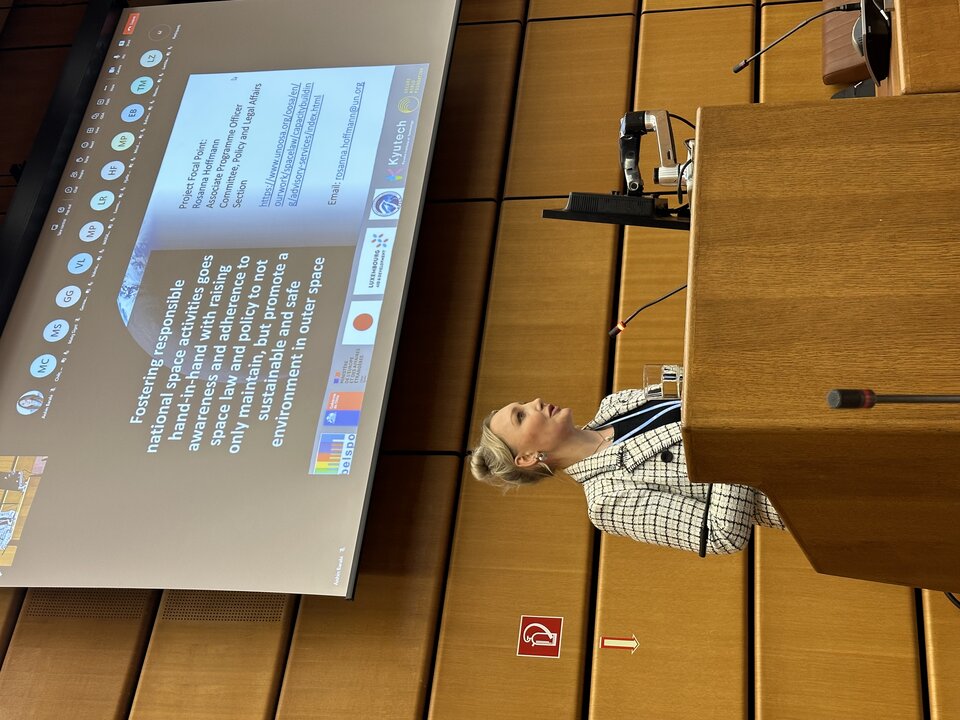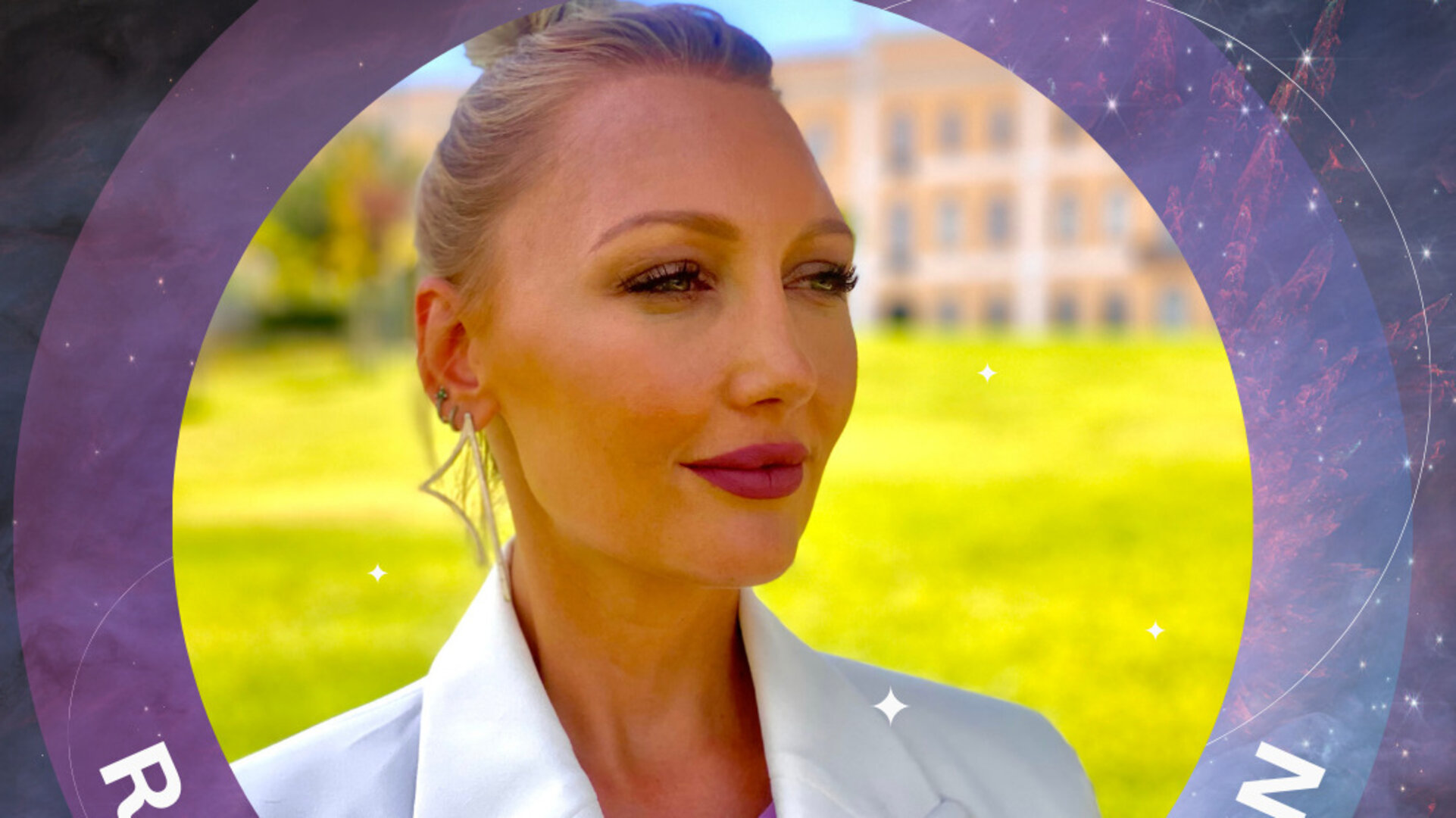"Meet ECSL Members" Series: Rosanna M. Hoffmann, Programme Officer for the Space Law for New Space Actors Project, United Nations Office for Outer Space Affairs (UN OOSA)
Read our latest "Meet ECSL Members" interview with Rosanna M. Hoffmann, Programme Officer and Project Manager for the Space Law for New Space Actors project, United Nations Office for Outer Space Affairs (UN OOSA). Learn about her previous experience in serving at the Austrian Ministry of Justice, teaching at the University of Vienna, and serving as the ECSL Executive Officer.

1. Hi Rosanna, how has your day been?
Hi, my day has been busy, and it’s not even lunch time yet. But I love busy days and time is currently flying by.
2. This year, you gave up the mantle of ECSL Executive Officer after two exciting years. Could you briefly introduce yourself and your new role?
Yes indeed I have. The last two years as ECSL Executive Officer have been truly amazing. Not only have I learned immensely from my supervisors and mentors at ESA, above all Alexander Soucek and Marco Ferrazzani, but I was also able to meet like-minded space law and policy enthusiasts around the world. Knowing that there is whole group of people with the same passion, drive and love for this very niche topic has truly been the highlight – amongst many other things of course. But you asked me to briefly introduce myself: As you mentioned I worked as the ECSL Executive Officer for the last two years, which however also encompassed working as a young graduate trainee in ESA’s legal department where I was able to learn and work besides space lawyers and lawyers specialised in international law on a daily basis. Prior to this I worked as an Assistant Lecturer at the University of Vienna, and in the Austrian Ministry of Justice within the section for Labour Law.
Currently, I am serving as project manager and programme officer of the UNOOSA Space Law for New Space Actors project, which aims to help UN Member States enhance their capacity to develop national space legislation and policy in line with international space law. This raises awareness of, and adherence to, the existing normative framework governing outer space activities, an aspect of heightened importance considering the rising number of (private) actors participating in outer space activities.
3. Did you always know you would want to work for an international organisation active in the space domain?
I always knew I wanted to work for an international organisation and within international law, however, I was never really sure what aspect of international law interested me the most. For a very long time I believed it was in the area of peacekeeping, which was what I researched during my first master thesis, however, as soon as a professor mentioned the words space law in 2016, I was hooked.
I had never heard of it before and needed to find out more about it. It was difficult for me at that point to actually find specific classes and courses on the topic, until I heard of the Manfred Lachs Space Law Moot Court in 2019. From that point onwards, it was the focus of my career ambition.
4. What first drew you to space law?
As already briefly touched upon above, the Manfred Lachs Space Law Moot Court drew me to space law. Working together with two amazing coaches (thank you!!) and two fantastic team members (merci <3) truly changed my life. We worked day and night for a year, during which the first lockdown started due to COVID-19, which meant our university shut down.
This however did not stop us, quite to the contrary – we got even more focused on the moot court and decided to set up meetings (nearly daily) in our apartments, use our pets as “ICJ Judges”, ask each other the most horrid questions (in preparation of some difficult judges… ) and support each other in researching every aspect of international space law, and public international law in general. We did in fact make it all the way to the World Finals, and not only did we win World’s Best Memorials, but your current ECSL Executive Officer won World’s Best Oralist as well! To summarise, I have always wanted to work within international law, however, the moot court showed me a side of international law that is expansive and truly exciting – I mean let us be honest here, how exciting does space law sound?
5. Would you recommend participating in the Manfred Lachs Space Law Moot Court to students interested in a career path similar to yours?
YES!
6. For your new role in the “Space Law for New Space Actors” project, you will need to engage with many different actors from the space sector. How has your background prepared you for this?
I believe that there are few aspects to note here in regard to “preparation”, some aspects however were not my own doing whatsoever and I can only thank my somewhat uncontroversial parents for it, namely the fact that I grew up and went to school in different continents across the globe. This truly helped me today in regards to working together with nationalities and cultures from any nation. I am in no way saying that this is a prerequisite for the job I am currently doing, but I do feel it helps me personally. Beyond that, I believe that the many years working in the Ministry of Justice helped me navigate some more bureaucratic aspects of my job, as well as how to work together with government officials. Last, but surely not least, working at ESA and especially the work I was able to do through the ECSL has given me the knowledge and training needed for my current work.
7. Is there any country you are most excited to travel next in the context of your new project?
I am excited for travelling to all countries requesting a technical advisory mission, and the list is truly long and getting longer on a weekly basis. This April, I had the pleasure of being able to travel to Nairobi, Kenya and delivered a three-day long space law technical advisory mission, the core of my work at the UN. In October and November 2023, I will be travelling to Chile and Costa Rica and I am already very much looking forward to this.
8. How would you describe the importance and value of academic research for your work in comparison with the importance of relevant work experience?
I personally believe that both aspects are equally important. Having relevant knowledge from academia, especially in international law is extremely helpful, as many work related questions will be first and foremost answerable based on this knowledge. In addition, academic knowledge will only get you so far, as experience in project management, mentoring, dealing with operators, being able to read and in fact understand contracts and agreements are some of the many aspects that are required at some point in a career in outer space (law and/or policy).
9. What are your ambitions for international space law for the next five years?
That is a loaded question My ambition is to be able to assist as many requesting countries with their national space law and policy. Personally, I would love to continue gathering expertise and knowledge in project management, especially project management at the United Nations Office for Outer Space Affairs. All I can say is shoot for the stars…
10. As a former Executive Officer, you are granted lifelong ECSL membership – what is the main reason why you would recommend ECSL student, individual or institutional membership to others?
I am so thankful to the ECSL Board and ESA for giving this special lifelong membership to former ECSL Executive Officers. I can truly recommend being part of the ECSL as you will not only be able to learn so much on space law and policy, but you will be part of a network of like-minded passionate people. Some of my most fond memories includes sitting in restaurants, late at night with space law giants and discussing fundamental questions on space law and policy – it is beyond exciting and special.
11. How would you like to see the Centre develop and grow in the next years?
I personally believe that the Centre has a good momentum that it should continue and utilise to expand its reach. There are a lot of students, young professionals, individuals, and institutions that are not aware of the benefits of being part of this network of like-minded people and learn from experts form the European Space Agency, as well as academia and industry. I have heard from so many members that the Centre truly helped them get a footing in the field of space (law and policy).
Sitting at the podium at the UN Committee on the Peaceful Uses of Outer Space and seeing a plethora of past and present ECSL members in the member state delegations, I am truly convinced that the ECSL's network will continue to support interdisciplinary discourse across Europe and foster new and upcoming space lawyers and policy experts joining the ever-important discussion on the future of space exploration.
12. Who do you want us to interview next?
I personally would love to hear from some of ECSL’s institutional members.


